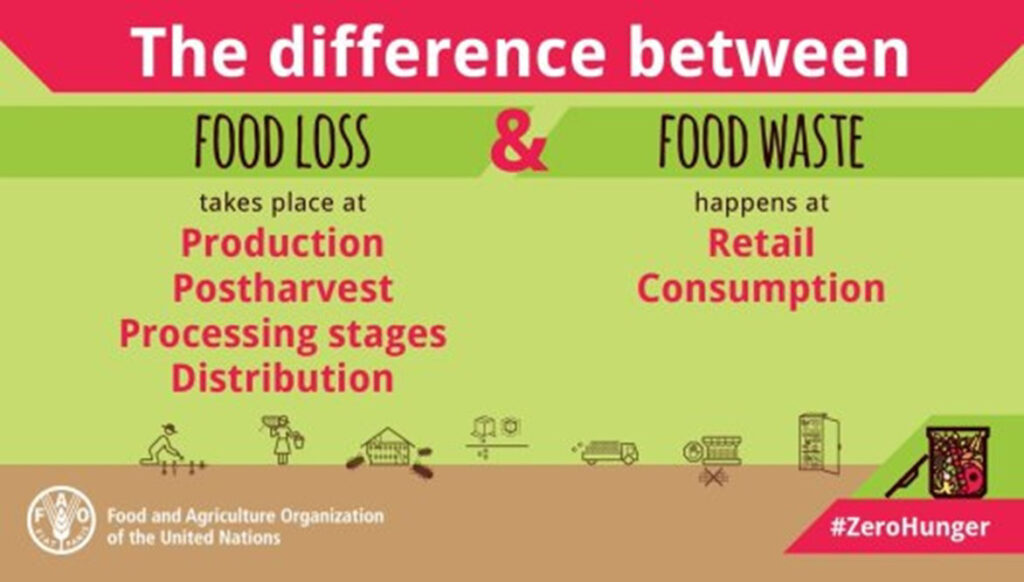More than a third of the world’s food production, about 2.5 billion tons, is lost or turned into waste every year. (WWF, 2021) This means that we waste about 79 tons of food every second during the year.
Food waste management has become one of the world`s prior challenges. Studies have shown that production of excessive amounts of food waste causes serious damage to the environment and is directly related to climate change. Therefore, one of the most effective ways to mitigate climate change is reducing food waste.It is important to know what food waste means, how it harms the environment and how we can contribute to climate change mitigation.
What is Food Waste?
Food and Agriculture Organization of the United Nations (FAO) – Explains that food waste is divided into three notions:
“Food loss refers to a decrease in mass (dry matter) or nutritional value (quality) of food that was originally intended for human consumption. These losses are mainly caused by inefficiencies in the food supply chains, such as poor infrastructure and logistics, lack of technology, insufficient skills, knowledge and management capacity of supply chain actors, and lack of access to markets. In addition, natural disasters play a role.
Food waste refers to food appropriate for human consumption being discarded, whether or not after it is kept beyond its expiry date or left to spoil. Often this is because food has spoiled but it can be for other reasons such as oversupply due to markets, or individual consumer shopping/eating habits.
Food wastage refers to any food lost by deterioration or waste. Thus, the term “wastage” encompasses both food loss and food waste.” (FAO, 2013)

What’s Wrong with Food Waste?
Imagine, If a quarter of the world`s wasted food survived – it would be enough to feed 870 million people who suffer from hunger. Furthermore, studies have shown that food waste is one of the main contributors in the destruction of our planet. According to new data from WWF-Driven To Waste, 10% of greenhouse gas emissions are caused by food waste.
Also, the use of agricultural resources is increasing in the world. Approximately 4.4 million km2 of agricultural land and 760 km3 of water are used to get 1.2 billion tonnes of the food that is wasted in the supply chain.
A huge number of edible food is placed in landfills in Georgia daily. Food waste starts to decompose in the landfills and releases greenhouse gases, including methane, which is at least 28 times more harmful than carbon dioxide.
What does this mean? – natural resources are exploited, energy is lost and lethal greenhouse gases are released just to produce food that we just throw away.
Important Facts About Food Waste
*
One-third of food produced each year is lost or wasted. Food waste is caused by overproduction, spoilage, overbuying, and a lot more!
*
Food waste is one of the biggest contributors to climate change!
*
Food waste accounts for 10% of the greenhouse gas emissions!
*
You are less likely to buy and consume fruits and vegetables due to its aesthetic or physical irregularities? For this reason one third of the fruits and vegetables globally, do not make it to our grocery store shelves because they are rejected to avoid complaints of bad quality product by the consumers.
*
Over 40% of waste in Georgia is organic waste, large portion of which is food!
*
As a result of the pandemic, the poverty levels are expected to rise to up to 125 million and 2020 marks the most severe increase in global food insecurity, impacting vulnerable households in almost every country. While we continue to waste the third of perfectly edible food.
*
It takes 50 liters of water to produce one orange. More than 820 million people go hungry every day and climate change is increasingly harming agriculture. Saving ugly fruit and vegetables isn’t just a question of ethics, it is a question of resources.
That’s why we all have to reduce our food waste and contribute to the process of mitigating climate change.
Remember, your contribution counts!
Take a look at our page and find out – how to reduce food waste in daily life.
